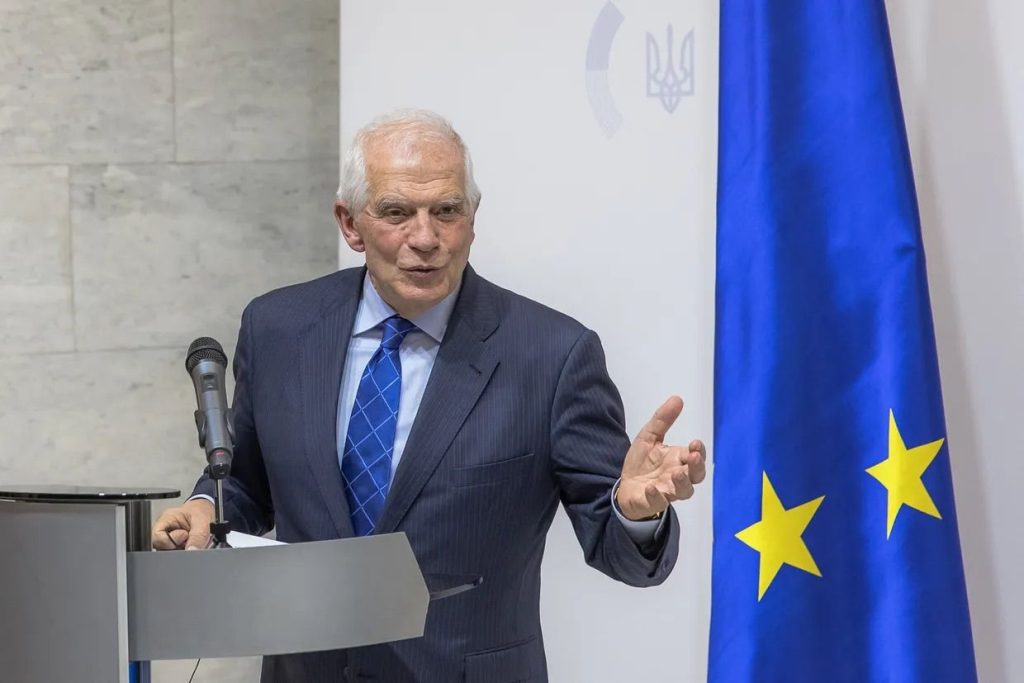During a meeting with Chinese Foreign Minister Wang Yi in Laos, the EU’s chief diplomat Josep Borrell urged China to support the peace process in Ukraine and halt the export of dual-use goods to Russia, which bolster its military capabilities. Borrell emphasized that China’s support for Russia negatively impacts EU-China relations and stressed the existential threat Russia’s war poses to Europe. He also referenced a joint statement by China and Brazil in May, which called for a peace conference but did not address Ukraine’s territorial integrity. Recently, Ukrainian Foreign Minister Dmytro Kuleba visited China for the first time since the start of the full-scale invasion and met with Wang. Kuleba stated that “China has unshakably reaffirmed its respect for the principle of Ukraine’s sovereignty and territorial integrity.” China has positioned itself as neutral in the Russia-Ukraine war but has simultaneously deepened economic ties with Moscow and has become Russia’s leading source of dual-use goods. Kyiv has repeatedly appealed to China to use its sway over Moscow to help bring an end to the war.
The Kyiv Independent reported that Kuleba held over three hours of talks with Chinese Foreign Minister Wang Yi during his visit to China. The Chinese Foreign Ministry later released a statement saying that “China has always been firmly committed to promoting a political solution to the crisis.” This statement highlights China’s stance on the conflict, reiterating their commitment to a peaceful resolution. The discussions between Kuleba and Wang likely involved diplomatic efforts to encourage China to use its influence to push for a peaceful resolution to the conflict in Ukraine. Ukraine has been seeking support from various countries to pressure Russia to end its aggression and restore peace in the region. China’s position as a major global power gives it the potential to play a significant role in facilitating negotiations and promoting peace in Ukraine.
China’s role in the Russia-Ukraine conflict has been a topic of international concern, especially as Beijing has maintained economic ties with Moscow while also expressing support for Ukraine’s sovereignty and territorial integrity. The EU, along with other Western nations, has been urging China to take a stance against Russia’s actions and to support efforts for peace in Ukraine. By calling on China to halt the export of dual-use goods to Russia, the EU is addressing a key aspect of Russia’s military capabilities that have been bolstered by Chinese exports. This move reflects a strategic effort by the EU to pressure China into aligning its actions with its stated commitment to respect Ukraine’s sovereignty.
The dynamics of the Russia-Ukraine conflict have implications beyond the immediate region, affecting global stability and alliances. The involvement of major powers like China adds complexity to the situation, as their actions and decisions can influence the course of the conflict and the prospects for peace. China’s economic interests, particularly its trade relations with Russia, present a challenge in terms of balancing its support for Ukraine with its ties to Moscow. The statements and engagements between Ukrainian and Chinese officials indicate ongoing diplomatic efforts to engage China in the peace process and seek its cooperation in resolving the conflict. The outcome of these diplomatic interactions could have significant ramifications for the future of the conflict and global security.
The meeting between Kuleba and Wang in China underscores the importance of diplomatic engagement and dialogue in addressing complex international crises like the Russia-Ukraine conflict. By emphasizing the need for political solutions and peaceful negotiations, both sides are signaling their commitment to resolving the conflict through dialogue and diplomacy. The role of actors like China in facilitating such discussions and promoting peaceful resolutions is crucial in navigating the challenges posed by the conflict. The statements from both Ukrainian and Chinese officials reflect a shared commitment to upholding the principles of sovereignty and territorial integrity, while also acknowledging the need for external support and collaboration to achieve a lasting peace in Ukraine.
In conclusion, the interactions between Ukrainian and Chinese officials highlight the ongoing efforts to engage key stakeholders in the Russia-Ukraine conflict and seek support for peace initiatives. The calls for China to play a constructive role in the peace process and refrain from actions that could escalate tensions underscore the importance of international cooperation and coordination in addressing complex crises. By leveraging diplomatic channels and engaging in dialogue, countries like Ukraine and China are working towards finding a resolution to the conflict that upholds the principles of sovereignty and peace. The outcomes of these diplomatic efforts will have far-reaching implications for the region and beyond, shaping the future of international relations and security. As the conflict continues to evolve, the engagement of various actors in finding a peaceful resolution remains critical in ensuring stability and security in Ukraine and the broader global context.


